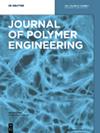Antimicrobially effective protein-loaded metal chelated chitosan composite
IF 1.7
4区 工程技术
Q4 POLYMER SCIENCE
引用次数: 0
Abstract
Abstract The immobilization of lysozyme onto a novel synthetic metal chelator composite based on chitosan/PAA-PMA (chitosan/acrylamide-maleic acid) and its effect on antimicrobial activity were the aim of the current study. The plain composite and the lysozyme immobilized composite were characterized according to scanning electron microscopy (SEM), Ultraviolet spectroscopy (UV), Fourier transform infrared (FT-IR), and X-ray diffraction (XRD) analysis. Furthermore, the activities of lysozyme and immobilized lysozyme were investigated, as well as their antimicrobial activity against Escherichia coli, Klebsiella pneumoniae, Pseudomonas aeruginosa, Enterococcus faecalis, and Staphylococcus aureus, as well as their cytotoxic effects, which were both approximately greater than those of free lysozyme. The last step was cytotoxic studies on lysozyme, chitosan composite, and lysozyme-immobilized chitosan composite, which showed no cytotoxic effect. Several investigations have shown that metal chelators improve lysozyme’s antibacterial action. Two carboxylic acids containing maleic acid were used as a metal chelator in this study. Lysozyme was immobilized from a side other than carboxylic acids, so that carboxylic acid groups, which are metal chelating groups, do not prevent synergy by competing with metal binding at neutral pH. This enhanced antimicrobial activity.高效抗菌蛋白质负载金属螯合壳聚糖复合材料
摘要以壳聚糖/PAA-PMA(壳聚糖/丙烯酰胺-马来酸)为载体,合成了一种新型金属螯合剂复合物,并对溶菌酶的固定化及其抗菌活性进行了研究。通过扫描电子显微镜(SEM)、紫外光谱(UV)、傅立叶变换红外光谱(FT-IR)和X射线衍射(XRD)分析,对平面复合材料和溶菌酶固定化复合材料进行了表征。此外,还研究了溶菌酶和固定化溶菌酶的活性,以及它们对大肠杆菌、肺炎克雷伯菌、铜绿假单胞菌、粪肠球菌和金黄色葡萄球菌的抗菌活性,以及他们的细胞毒性作用,这两种活性均约大于游离溶菌酶。最后对溶菌酶、壳聚糖复合物和溶菌酶固定化壳聚糖复合材料进行了细胞毒性研究,未显示细胞毒性作用。几项研究表明,金属螯合剂可以提高溶菌酶的抗菌作用。本研究使用两种含有马来酸的羧酸作为金属螯合剂。溶菌酶是从羧酸以外的一侧固定的,因此羧酸基团是金属螯合基团,在中性pH下与金属结合竞争不会阻止协同作用。这增强了抗菌活性。
本文章由计算机程序翻译,如有差异,请以英文原文为准。
求助全文
约1分钟内获得全文
求助全文
来源期刊

Journal of Polymer Engineering
工程技术-高分子科学
CiteScore
3.20
自引率
5.00%
发文量
95
审稿时长
2.5 months
期刊介绍:
Journal of Polymer Engineering publishes reviews, original basic and applied research contributions as well as recent technological developments in polymer engineering. Polymer engineering is a strongly interdisciplinary field and papers published by the journal may span areas such as polymer physics, polymer processing and engineering of polymer-based materials and their applications. The editors and the publisher are committed to high quality standards and rapid handling of the peer review and publication processes.
 求助内容:
求助内容: 应助结果提醒方式:
应助结果提醒方式:


